
Directing a movie is all about establishing and maintaining a consistent tone. When the editing, art direction, and cinematography all complement each other -- and when the actors understand how subtly they need to play each scene -- that's when a filmmaker has greatness within reach. James Gray achieves just that with Two Lovers because he tells a story of emotionally operatic proportion in the tone of a gentle whisper. The film stars Joaquin Phoenix as Leonard Kraditor, a suicidal young man living with his parents (Isabella Rossellini and Moni Moshonov) after a mental breakdown triggered by the tragic end of an otherwise happy engagement. His sensitive but traditional Jewish parents want him to take over the family dry-cleaning business, and they'd like to help him mend his broken heart. To that end, they introduce him to Sandra Cohen (Vinessa Shaw), the oldest daughter of one of his father's business colleagues. Although the two begin a tentative romance, Leonard soon falls passionately in love with Michelle Rausch (Gwyneth Paltrow), a neighbor dealing with her own emotional turmoil -- she's dating a married man (Elias Koteas) who won't follow through on promises to leave his wife. Phoenix drives the movie with a remarkable performance as a simple man who's as torn apart by his passions as he is compelled to act on them. He wants to be a photographer, but his dad wants him to run the family business. He loves the troubled blonde girl, but his parents keep pushing for the nice Jewish girl. Part of him wants to be the dutiful son, and he sees the appeal of living the life that's expected of him -- in no small part because of the tragedy he's already experienced. Taking advantage of the nuances in the script, Phoenix plays all of these internal struggles without resorting to James Dean-inspired brooding. Phoenix reveals the depth of Leonard's pain in the character's everyday conversations. The character forever tries to do the right thing for both himself and the people around him, and Phoenix gently underscores every interaction in subtle ways that show how he's being torn apart internally. What makes the performance all the more engaging is that Gray's dialogue never makes any of Leonard's internal life explicit. Leonard reveals his personal struggles with his voice, his eyes, and his mannerisms -- when he lays his soul bare for the woman he loves it's a striking contrast to how he approaches everyone else in the movie. This is the third time Gray and Phoenix have worked together, and if nothing else, the movie shows that they've developed a remarkable trust in one another's skills. But it's not just Phoenix's show. Vinessa Shaw and Gwyneth Paltrow deliver finely nuanced performances, and both of them deftly reveal subtle truths about their characters through interpretation rather than dialogue. Elias Koteas has scarcely ten minutes of screen time, but somehow manages to make us sympathize with the philandering husband who's been stringing Michelle along, and Isabella Rossellini shines as Leonard's mother, radiating a compassion for her son that never crosses over into stereotypical maternal suffocation. The entire story practically begs for scenes with huge cathartic upheavals -- the kind of scenes that make their way into Oscar highlight reels -- but instead Gray plays everything close to the vest because he knows that's exactly what his characters would do.
